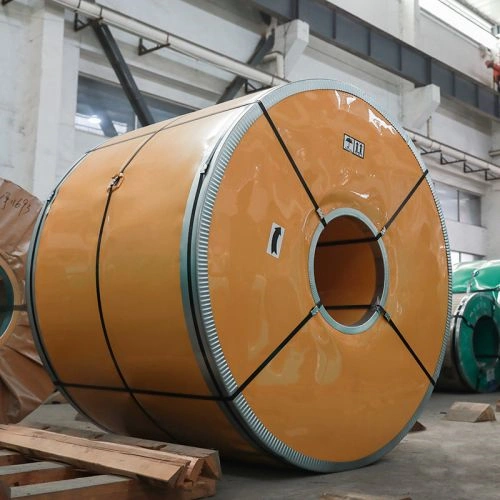Understanding Stainless Steel Coil: Types, Grades, and Applications
Stainless steel coils are a versatile material used across numerous industries due to their strength, durability, and resistance to corrosion. Whether in construction, automotive manufacturing, or food processing, stainless steel coils play a critical role in the production of high-performance products. This article explores the types of stainless steel coils, the various grades available, their applications, and the factors to consider when choosing the right coil for your needs.

What is Stainless Steel Coil?
Stainless steel coil is a form of steel that is rolled into thin sheets or strips and wound into coils. The rolling process gives stainless steel coils a uniform thickness and a smooth surface. These coils can be easily processed and shaped into various products for both industrial and commercial use. The inherent properties of stainless steel, such as its resistance to rust, high tensile strength, and versatility, make it ideal for coiling.
Manufacturing stainless steel coils involves heating and rolling raw steel through a series of rollers until it reaches the desired thickness. Once cooled, the steel is coiled for storage or further processing. This process ensures that the coils maintain a consistent structure, which is essential for the wide range of applications they serve.
Types of Stainless Steel Coils
Stainless steel coils come in various types, each suited for specific uses and environments. Understanding the differences between them is key to selecting the right coil for your project.
Hot-Rolled Coils
Hot-rolled stainless steel coils are created by heating the steel above its recrystallization temperature and then rolling it to the desired thickness. This process produces coils with a rough, matte finish and a slightly uneven surface. Hot-rolled coils are typically used in structural applications, such as construction and heavy-duty machinery, because they are cost-effective and durable.
Cold-Rolled Coils
Cold-rolled coils are made by passing hot-rolled coils through a series of rollers at room temperature. This process results in a smoother, more polished surface and greater dimensional precision. Cold-rolled stainless steel coils are often used in applications that require tight tolerances and a high-quality finish, such as in the automotive and appliance industries.
Annealed Coils
Annealed stainless steel coils are heat-treated to reduce internal stresses and increase their ductility. The annealing process also enhances corrosion resistance and makes the material more suitable for forming complex shapes. These coils are often used in products where additional strength or malleability is required, such as in surgical instruments or industrial components.
Polished Coils
Polished stainless steel coils are finished with a reflective surface, giving them a shiny, mirror-like appearance. These coils are commonly used in decorative applications, such as architectural cladding, consumer goods, and kitchen appliances. The polished finish not only adds aesthetic value but also enhances the material’s resistance to corrosion.
Custom Coils
Custom stainless steel coils are designed to meet the unique needs of specific industries or applications. Whether it’s a particular size, thickness, or surface finish, custom coils can be tailored to fit exact specifications. Manufacturers use advanced technology to cut, bend, or weld these coils into specialized components.
Grades of Stainless Steel Coil
Stainless steel coils come in different grades, each offering distinct properties suited for various applications. The grade of stainless steel determines its strength, corrosion resistance, and other critical factors.
Grade 304 is one of the most widely used grades of stainless steel due to its excellent corrosion resistance and good mechanical properties. It is commonly used in a variety of industries, including construction, food processing, and consumer products. The combination of affordability, durability, and ease of fabrication makes it an excellent choice for general-purpose applications.
Grade 316 stainless steel offers superior corrosion resistance, especially in marine and acidic environments. It is more resistant to chloride corrosion, making it ideal for industries such as chemical processing, marine, and pharmaceuticals. While it is more expensive than Grade 304. its enhanced durability makes it worthwhile for applications exposed to harsh conditions.
Grade 430 stainless steel is a magnetic, ferritic stainless steel that is more affordable compared to 304 and 316 grades. It is less resistant to corrosion, but it is still used in many non-corrosive applications, such as in household appliances, automotive trim, and other decorative uses.
Grade 321 stainless steel is highly resistant to high temperatures and oxidation. It is commonly used in high-heat applications, such as in exhaust systems, heat exchangers, and welding components. This grade also offers better resistance to stress corrosion cracking than Grade 304. making it suitable for high-stress environments.
Other Specialized Grades
There are several other grades of stainless steel coils, such as Grades 310. 410. and 430F. These grades have unique properties suited for specific applications, such as high-temperature environments, cryogenic temperatures, or specific corrosion resistance needs.
Applications of Stainless Steel Coils
Stainless steel coils are used in numerous industries for a wide range of applications.
Construction Industry
Stainless steel coils are widely used in construction for structural elements like framing, cladding, and roofing. Their strength, durability, and resistance to the elements make them an essential material for buildings, bridges, and other infrastructure projects.
Automotive Industry
In the automotive industry, stainless steel coils are used in components such as exhaust systems, catalytic converters, and body panels. These coils provide excellent corrosion resistance and can withstand the extreme conditions found in automotive environments.
Food & Beverage Industry
Stainless steel is a primary material in the food and beverage industry because it meets hygiene and durability standards. Stainless steel coils are used in food processing equipment, storage tanks, and utensils, where the material’s ability to resist corrosion and high temperatures is essential.
Medical Industry
Stainless steel coils are used in the medical industry to manufacture surgical instruments, implants, and other medical devices. Their non-reactive properties, combined with strength and precision, make them ideal for use in applications that require sterility and durability.
Energy & Power Generation
Stainless steel coils are critical in energy production, especially in applications like boilers, heat exchangers, and power plants. Their ability to handle high pressures and temperatures ensures that they remain functional even in demanding energy sectors.
Consumer Goods
Stainless steel coils are commonly used in the production of household appliances, such as refrigerators, ovens, and dishwashers, as well as in electronics and small consumer products. Their versatility and aesthetic appeal make them a go-to material for modern consumer goods.
Stainless steel coils are essential components in many industries due to their strength, corrosion resistance, and versatility. Understanding the different types, grades, and applications of stainless steel coils is crucial when selecting the right material for your project. By considering factors like environmental exposure, strength requirements, and cost, you can make an informed decision that ensures the longevity and performance of your stainless steel products.
Ready to purchase stainless steel coils or need more information? Contact us today for a quote or to speak with a specialist. We provide high-quality stainless steel coils tailored to your specific needs.
